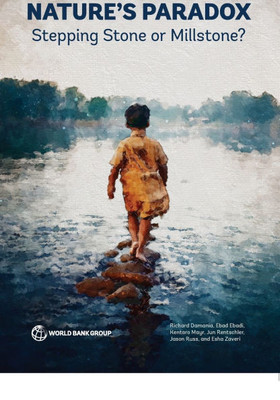
Sale
Nature's Paradox: Stepping Stone or Millstone?
World Bank Publications
ISBN13:
9781464821646
$43.95
$40.44
Does access to natural resources and a clean environment provide a stepping stone out of deprivation, or does it act as a millstone that impedes the transition to greater progress? Nature's Paradox: Stepping Stone or Millstone? assesses the intersection of the two major crises of the 21st century--the growing scarcity of land, air, and water and rising vulnerability. As countries around the world grapple with multiple crises, local communities and the most vulnerable populations often bear the brunt of the impacts. Vulnerable and underrepresented groups predominantly reside in rural areas, are employed in agriculture, and have limited access to essential public services. While these groups may be less exposed to air and water pollution, the impact of their underrepresentation in decision-making processes is disproportionately high, likely due to a lack of public services and an inability to cope with environmental stresses. These groups also suffer more due to land degradation and deforestation, with the notable exception of Indigenous peoples in Latin America, who experience lower deforestation rates. Understanding the intersection of social vulnerability and environmental degradation helps address these dual crises more effectively. Through this thorough analysis, Nature's Paradox highlights how sound policy designs can create economic opportunities by promoting environmental sustainability. Its findings will interest policy makers, stakeholders, researchers, development practitioners, and the general public. Finally, Nature's Paradox explores additional dimensions of social exclusion, including poverty and gender disparities, and their interplay with the developed underrepresentation index, offering a more comprehensive understanding of the potential interconnections between social exclusion and environmental hazards. The analysis highlights the difficult choices socially excluded and underrepresented populations face between economic opportunities and environmental quality. The report concludes with a call for policy designs to ensure that environmental sustainability efforts are equitable and that progress is environmentally sustainable.
- | Author: Richard Damania
- | Publisher: World Bank Publications
- | Publication Date: May 21, 2025
- | Number of Pages: 00148 pages
- | Binding: Paperback or Softback
- | ISBN-10: 146482164X
- | ISBN-13: 9781464821646
- Author:
- Richard Damania
- Publisher:
- World Bank Publications
- Publication Date:
- May 21, 2025
- Number of pages:
- 00148 pages
- Binding:
- Paperback or Softback
- ISBN-10:
- 146482164X
- ISBN-13:
- 9781464821646





